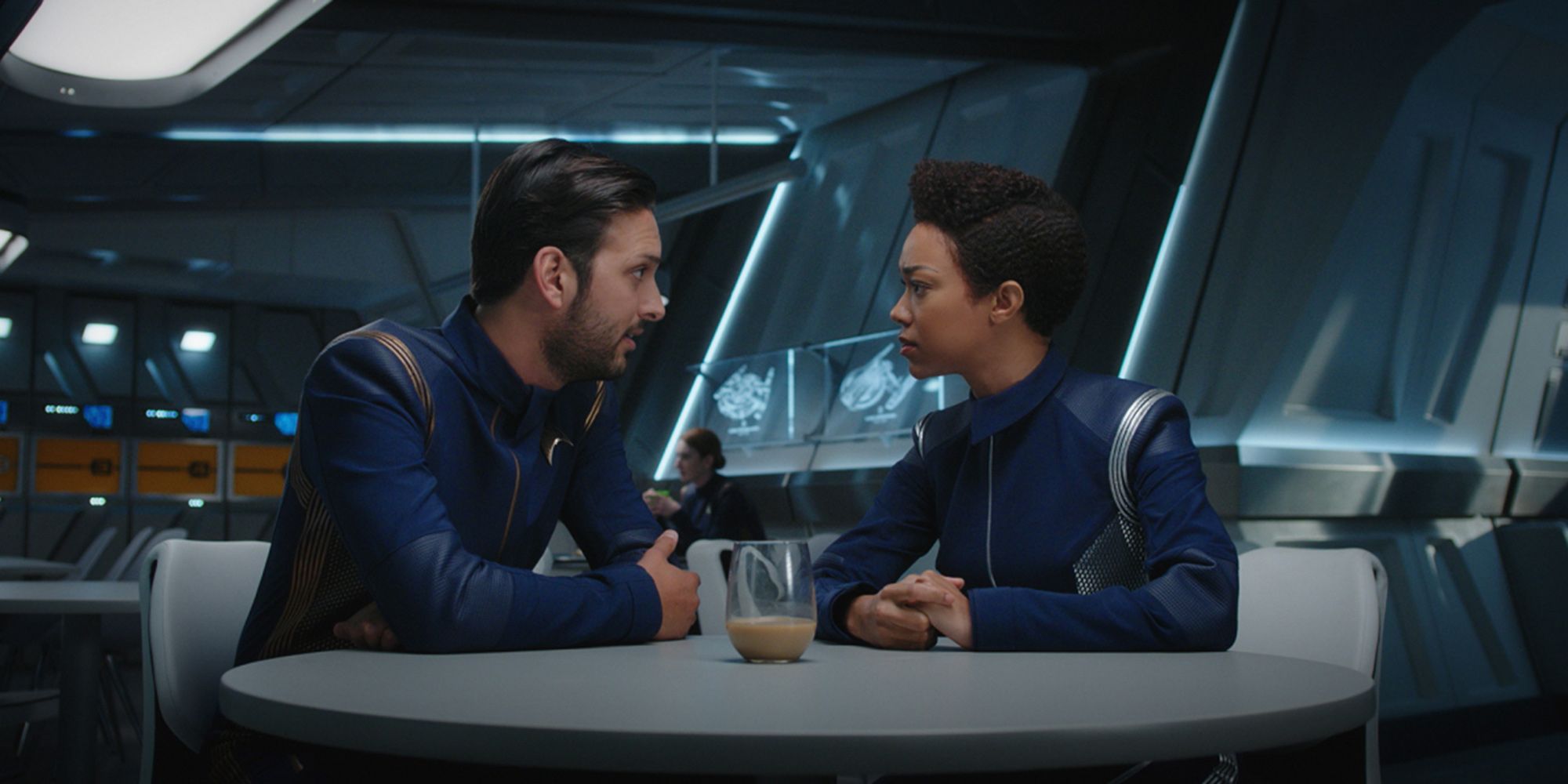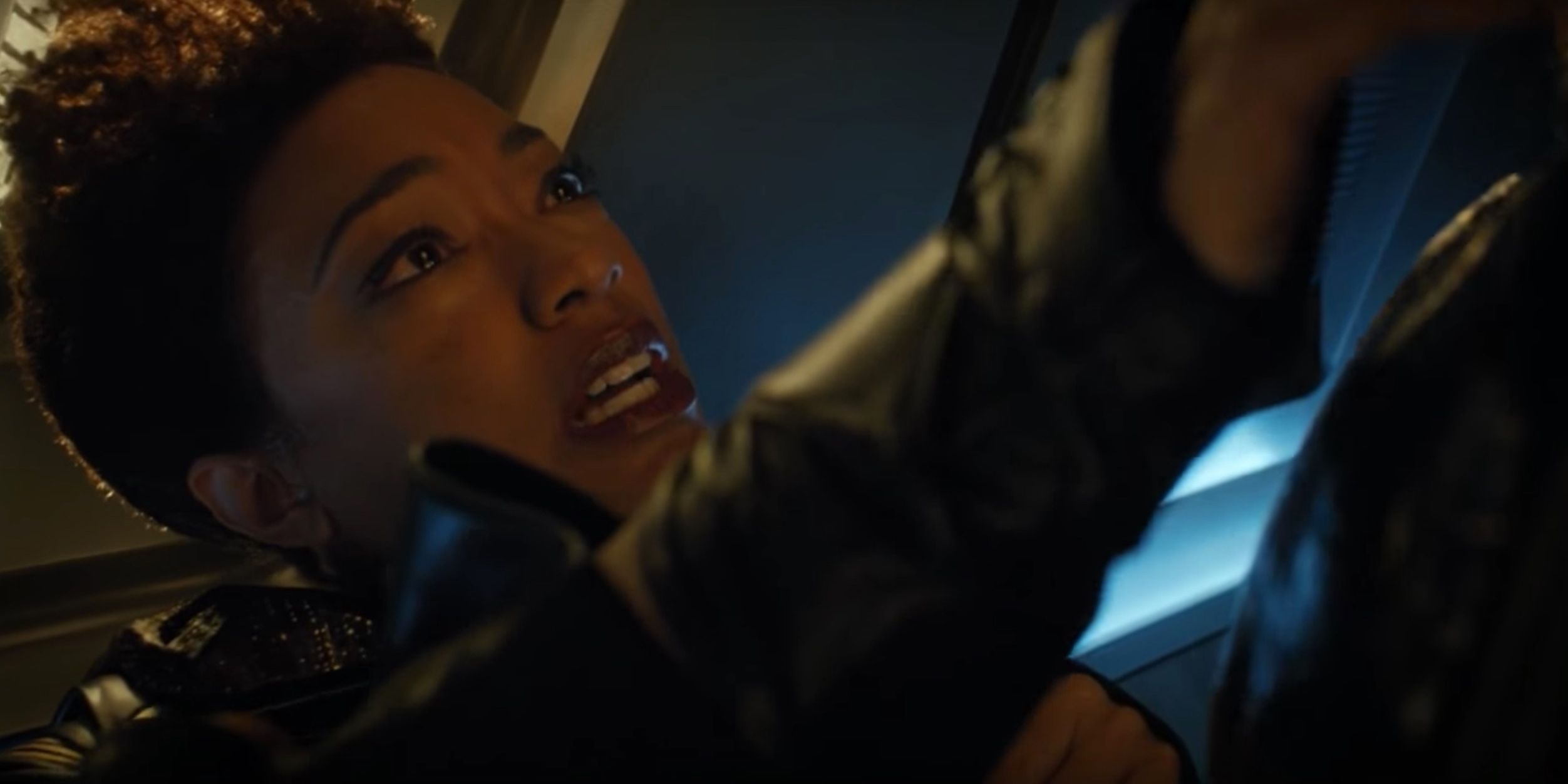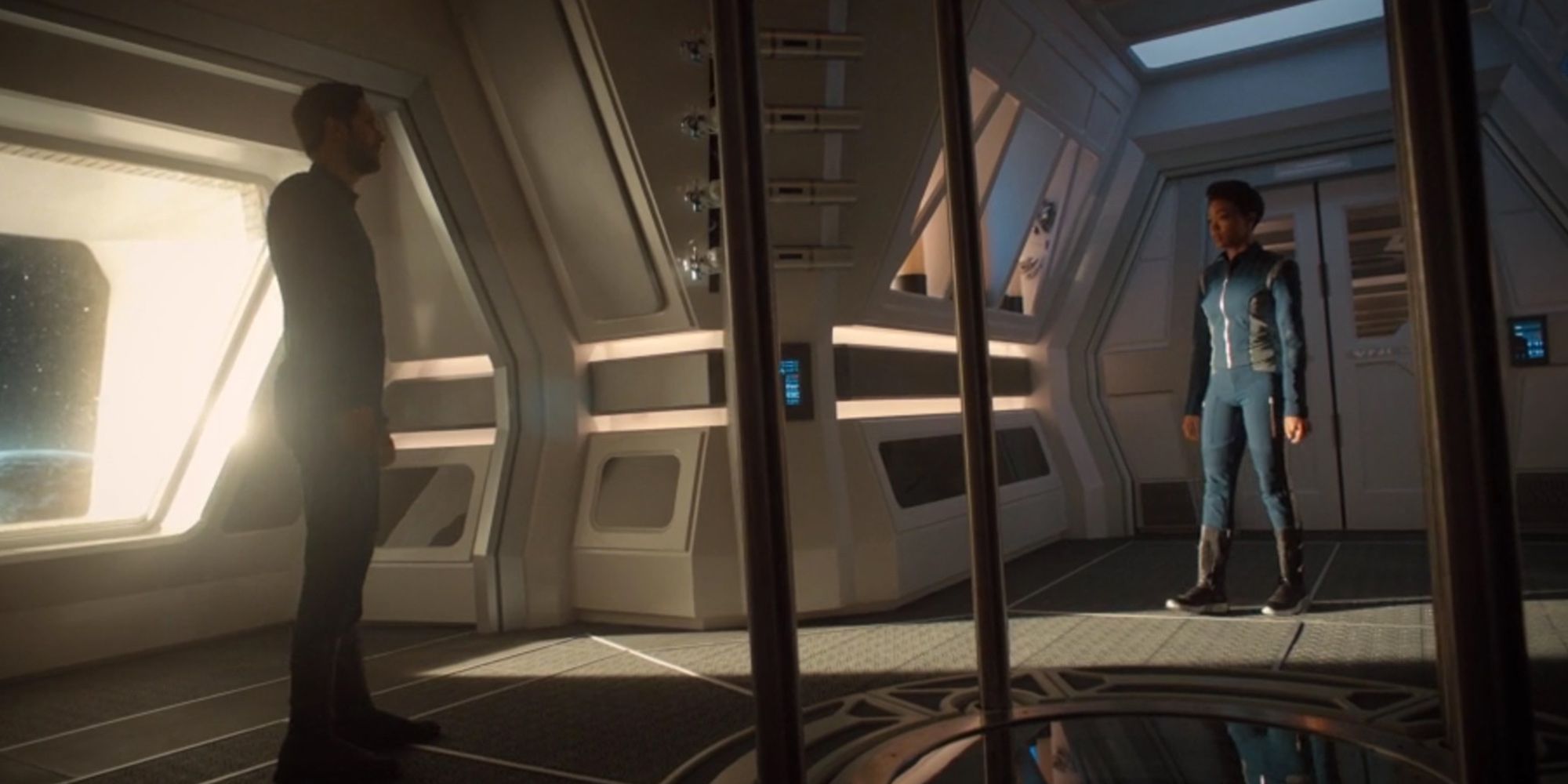The romance between Ash Tyler and Michael Burnham came to an end on last week's of Star Trek: Discovery, "The War Without, The War Within." After returning from the Mirror Universe, Burnham avoids seeing the newly wakened and (supposedly Voq-less) Ash Tyler. She adamantly refuses when Saru asks her to meet with him in the hopes her presence will speed along his healing process, and it's not until Tilly makes an impassioned plea on behalf of the former pilot that Burnham consents to see him. When she does, it's only to communicate that she is ending their relationship because despite the fact that he's no longer a sleeper agent, she can't escape the fact that he lied to her about his mental state and something wearing his face tried to kill her.
Tyler dismisses her fears and demands she admit what's really going on -- the relationship hit a rough patch and she's running the minute things get hard. Burnham's shocked that he would minimize the effect his attack had on her, and his attitude only makes her double-down on her assertion that they can't be together at this time, possibly ever again.
Sonequa Martin-Green and Shazad Latif executed the scene with more of the flawless work we've come to expect from them, deftly embodying the complexities of one of Star Trek's most unique relationships. We can't deny the depth of feeling between these two, but equally prevalent is Tyler's desperation and fragility alongside Burnham's need for stability and safety in a perilous time and the undeniable fact that she will not find either of those with him. Romance on Trek is rarely this multifaceted or trenchant, but the real accomplishment here is the revelation that this entire relationship was actually a low-key metaphor for domestic abuse.
Before you go any further, we're not saying that Ash Tyler is actually abusive. His attack on Burnham during their time aboard the I.S.S. Shenzou was 100% a result of the mind and body altering practices he underwent at the hands of the Klingons, as established on the show. The only valid excuse for laying hands on your S.O. is that the fanatical Klingon sleeping inside your brain took the wheel. Voq attacked Burnham, not Ash Tyler. But specifics aside, this is an almost textbook progression of an abusive relationship.
Pop culture is home to endless stories of women seduced by charming, charismatic men who expertly cultivate emotional dependence, at which point, physical and emotional abuse can thrive and often does. They do this initially by engaging in a dogged pursuit of their partners, followed by intense declarations of love and attraction, putting the other person on a pedestal early on. But that is, of course, just one side of the coin. After love bombing comes isolation from family and friends, followed by actual abusive behavior committed against a person who is now inextricably tied to the abuser emotionally, socially and often practically.
Page 2: [valnet-url-page page=2 paginated=0 text='Tyler%20Is%20the%20Perfect%20Guy%2C%20At%20Least%20Until%20He%20Isn%27t']
Ash Tyler was the active pursuer of a hesitant and inexperienced Burnham, coaxing her into engaging in a romance with someone who'd recently undergone intense trauma. He acts as her savior, to a degree, offering a woman who's still a pariah a valuable sense of inclusion, confidence and validation. He's the perfect guy, until he isn't. When Tyler's PTSD/personality overlay starts to rear its head, Burnham does all she can to support him, even at the cost of lying to her superiors about his fitness for duty. She keeps his secret at great risk to herself and it creates a separation between her and the rest of the crew considering she's covering up behavior that could potentially endanger the lives of everyone on the ship.
Finally, after weeks of hinting at his presence, the other side of the Ash Tyler coin emerges as Voq sabotages their mission on Harlak and then tries to kill Burnham on the I.S.S. Shenzou.
We finally got to the aftermath of that attack in this week's episode, and yet more hallmarks of abusive relationships made their presence known. Most victims tend to feel responsible for the abuse, either because they didn't leave after early warning signs or because they've been conditioned to believe they're responsible for their partner's outbursts. Even though she's the victim in the situation, Burnham still blames herself for her involvement and acceptance of the role of mental tether Tyler assigned to her.
As for abusive partners, attacks are often followed by profuse apologies and promises of improvement that are simultaneously conditioned on the desperate need to stay together. The minute he's alone with her, Tyler tells Burnham he's sorry, promises Voq is gone never to return and declares that his very identity as Ash Tyler is dependent on her as she was what his human side clung to when Voq tried to completely sublimate it. He literally says, "And I can't find my way back without you."
So, regardless of the narrative details that prevent Tyler from becoming a traditional villain, it's impossible to ignore the parallels between his relationship with Burnham and something we might see on Law and Order: SVU. But honestly, it's Tyler's very nature as a victim in his own right and Burnham's decision to reject him in spite of that that makes this story so resonant in the first place.
One of the reasons cycles of abuse perpetuate themselves is that most people don't know they're in one until it's too late. Abusers are as adept at victimizing themselves as they are other people, so partners stay not only because they've been groomed into some kind of co-dependence, but also because they think the problem is fixable and they're willing to risk their own well-being in order to do so. This is usually the only kind of story we see represented in mainstream media -- a woman becomes trapped in the cycle and only escapes after intense pain and degradation, if she escapes at all. That's a problem in and of itself.
It's not that those representations of women in abusive relationships aren't accurate -- tragically, they are. But while it's necessary to demonize abuse by showing it's most catastrophic outcomes, it's just as necessary to see a woman heed warning signs, go on the offensive and put her own needs above that of her relationship. Michael Burnham saw a clear threat to her well-being early on and instead of putting her lover's needs above her own, she abandons the relationship before it can do any more damage. It's an incredibly empowering example to set for female audiences who are used to having their heroines victimized before they emerge victorious.
Since its inception, Star Trek's always been a vehicle for the expression of progressive values and the illumination of social issues. Discovery's made this mission one of their top priorities, and Burnham's separation from Tyler is one of the subtler messages the show's sent, but also one of its most effective. Michael Burnham's happy ending won't come when she finds a partner, nor will it come if and when she's rescued from a dangerous situation. She's on a journey of self-discovery and self-redemption, and "The War Without, The War Within," showed us how capable of and willing she is to do that by herself.



